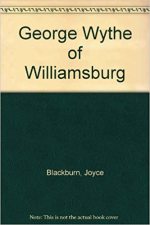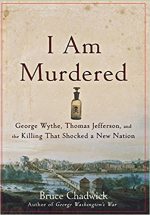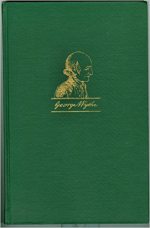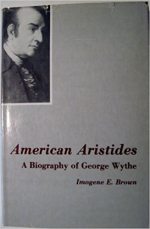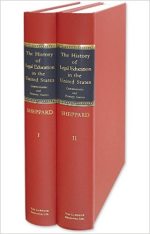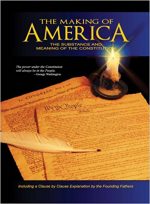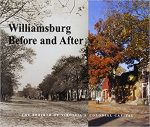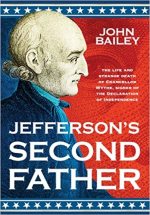George Wythe (pronounced “with”) was the personal mentor to Thomas Jefferson, James Madison (1749-1812) [a cousin to the more famous James Madison], John Marshall, and many other notable founders of the United States. Consequently, he was known as America’s “Teacher of Liberty.”
A statesman in his own right, Wythe signed the Declaration of Independence, served in the First Continental Congress, and was a Virginia delegate to the Constitutional Convention of 1787. He also helped develop the Bill of Rights. While teaching at the College of William and Mary, he was the first professor to make American Constitutional Law the subject of regular instruction.
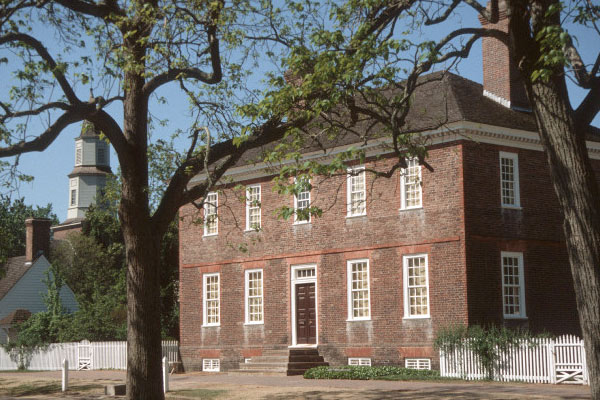
George Wythe, the second of Thomas and Margaret Wythe’s three children, was born in 1726 on his family’s plantation on the Back River in Elizabeth City County, VA. Both parents died when Wythe was young, and he grew up under the guardianship of his older brother, Thomas. Though Wythe was to become an eminent jurist and teacher, he received very little formal education. He learned Latin and Greek from his well-educated mother, and he probably attended for a time a grammar school operated by the College of William and Mary.
Wythe’s brother later sent him to Prince George County to read law under an uncle. In 1746, at age 20, he joined the bar, moved to Spotsylvania County, and became associated with a lawyer there. In 1747 he married his partner’s sister, Ann Lewis, but she died the next year. In 1754 Lt. Gov. Robert Dinwiddie appointed him as acting colonial attorney general, a position that he held for only a few months. The next year, Wythe’s brother died and he inherited the family estate. He chose, however, to live in Williamsburg in the house that his new father-in-law, an architect, designed and built for him and his wife, Elizabeth Taliaferro. They married in 1755, and their only child died in infancy.
At Williamsburg, Wythe immersed himself in further study of the classics and the law and achieved accreditation by the colonial supreme court. He served in the House of Burgesses from the mid-1750s until 1775, first as delegate and after 1769 as clerk. In 1768 he became mayor of Williamsburg, and the next year he sat on the board of visitors of the College of William and Mary. During these years he also directed the legal studies of young scholars, notably Thomas Jefferson. Wythe and Jefferson maintained a lifelong friendship, first as mentor and pupil and later as political allies.
Wythe first exhibited revolutionary leanings in 1764 when Parliament hinted to the colonies that it might impose a stamp tax. By then an experienced legislator, he drafted for the House of Burgesses a remonstrance to Parliament so strident that his fellow delegates modified it before adoption. Wythe was one of the first to express the concept of separate nationhood for the colonies within the British empire.
Audience with George Wythe
When war broke out, Wythe volunteered for the army but was sent to the Continental Congress. Although present from 1775 through 1776, Wythe exerted little influence and signed the Declaration of Independence after the formal signing in August 1776. That same year, Wythe, Jefferson, and Edmund Pendleton undertook a 3-year project to revise Virginia’s legal code. In 1777 Wythe also presided as speaker of the Virginia House of Delegates.
An appointment as one of the three judges of the newly created Virginia high court of chancery followed in 1778. For 28 years, during 13 of which he was the only chancellor, Wythe charted the course of Virginia jurisprudence. In addition, he was an ex officio member of the state superior court.
Wythe’s real love was teaching. In 1779 Jefferson and other officials of the College of William and Mary created the first chair of law in a U.S. institution of higher learning and appointed Wythe to fill it. In that position, he educated America’s earliest college-trained lawyers, among them John Marshall and James Monroe. In 1787 he attended the Constitutional Convention but played an insignificant role. He left the proceedings early and did not sign the Constitution. The following year, however, he was one of the Federalist leaders at the Virginia ratifying convention. There he presided over the Committee of the Whole and offered the resolution for ratification.
In 1791, the year after Wythe resigned his professorship, his chancery duties caused him to move to Richmond, the state capital. He was reluctant to give up his teaching, however, and opened a private law school. One of his last and most promising pupils was young Henry Clay.
George Wythe and American Independence
In 1806, in his eightieth year, Wythe died at Richmond under mysterious circumstances, probably of poison administered by his grandnephew and heir, George Wythe Sweeney. Reflecting a lifelong aversion to slavery, Wythe emancipated his slaves in his will. His grave is in the yard of St. John’s Episcopal Church in Richmond, VA.
Source: America’s Founding Fathers: Virginia, National Archives
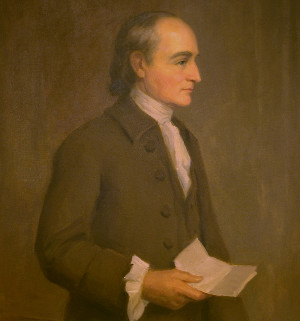
The first chair of law in America and the second in the English-speaking world was established December 4, 1779, at the College of William and Mary. The College’s board of visitors included among others Governor Thomas Jefferson, James Blair, James Madison (1749-1812) [a cousin to the more famous James Madison], Edmund Randolph, Thomas Nelson, and Benjamin Harrison. They elected as the first professor to occupy that chair George Wythe, styled by Jefferson as the American Aristides.
. . .
[Thomas] Jefferson said of Wythe, “He was my ancient master, my earliest and best friend, and to him I am indebted for first impressions which have had the most salutary influence on the course of my life.”Besides Jefferson, Wythe at one time or another taught John Marshall, James Monroe, Edmund Randolph, and Henry Clay. Thus the mind of George Wythe, acting through those whom he had trained, dominated the policies of this republic for fully fifty years, and is still a potent force.
George Wythe: William & Mary’s – and the nation’s – first law professor, W&M Law School
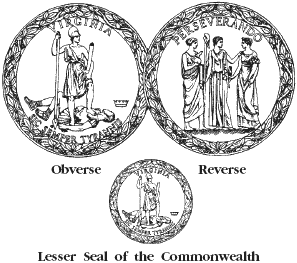
Seal of the Commonwealth of Virginia
Wythe played a role in creating [Virginia’s] new constitution and served with Jefferson on the committee that revised Virginia’s laws. Wythe also sat on the committee to design Virginia’s seal.
. . .
Jefferson wrote a brief sketch of Wythe near the end of his own lifetime.
George Wythe, Thomas Jefferson Encyclopedia, Monticello.
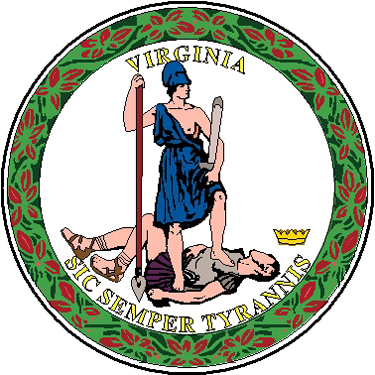
Sic semper tyrannis
(letter) I became acquainted with Mr. Wythe when he was about thirty-five years of age. He directed my studies in the law, led me into business, and continued, until death, my most affectionate friend. A close intimacy with him, during that period of forty odd years, the most important of his life, enables me to state its leading facts, which, being of my own knowledge, I vouch their truth. Of what precedes that period, I speak from hearsay only, in which there may be error, but of little account, as the character of the facts will themselves manifest. In the epoch of his birth I may err a little, stating that from the recollection of a particular incident, the date of which, within a year or two, I do not distinctly remember. These scanty outlines, you will be able, I hope, to fill up from other information, and they may serve you, sometimes, as landmarks to distinguish truth from error, in what you hear from others. The exalted virtue of the man will also be a polar star to guide you in all matters which may touch that element of his character. But on that you will receive imputation from no man; for, as far as I know, he never had an enemy. Little as I am able to contribute to the just reputation of this excellent man, it is the act of my life most gratifying to my heart: and leaves me only to regret that a waning memory can do no more.
. . .
(notes) George Wythe was born about the year 1727 or 1728, of a respectable family in the county of Elizabeth City, on the shores of the Chesapeake. He inherited, from his father, a fortune sufficient for independence and ease. He had not the benefit of a regular education in the schools, but acquired a good one of himself, and without assistance; insomuch, as to become the best Latin and Greek scholar in the state. It is said, that while reading the Greek Testament, his mother held an English one, to aid him in rendering the Greek text conformably with that. He also acquired, by his own reading, a good knowledge of Mathematics, and of Natural and Moral Philosophy. He engaged in the study of the law under the direction of a Mr. Lewis, of that profession, and went early to the bar of the General Court, then occupied by men of great ability, learning, and dignity in their profession. He soon became eminent among them, and, in process of time, the first at the bar, taking into consideration his superior learning, correct elocution, and logical style of reasoning; for in pleading he never indulged himself with an useless or declamatory thought or word; and became as distinguished by correctness and purity of conduct in his profession, as he was by his industry and fidelity to those who employed him. He was early elected to the House of Representatives, then called the House of Burgesses, and continued in it until the Revolution. On the first dawn of that, instead of higgling on half-way principles, as others did who feared to follow their reason, he took his stand on the solid ground, that the only link of political union between us and Great Britain, was the identity of our Executive; that that nation and its Parliament had no more authority over us, than we had over them, and that we were co-ordinate nations with Great Britain and Hanover.
Letter to John Saunderson, Esq., Notes for the Biography of George Wythe, by Thomas Jefferson, August 31, 1820. (Copy of handwritten note at the Library of Congress.)
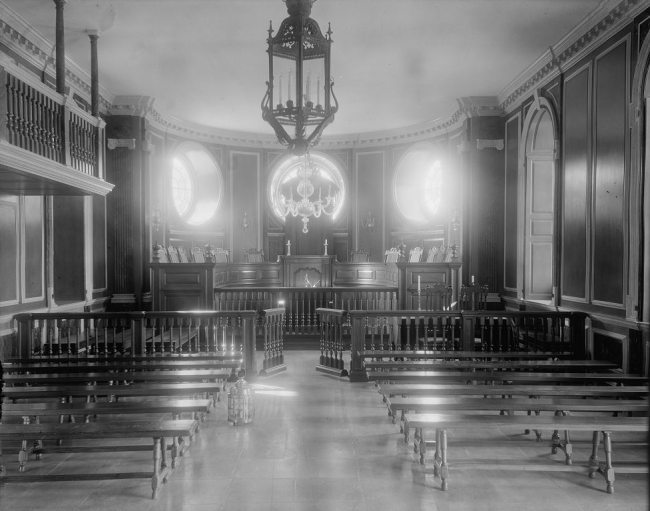
One person has estimated that Wythe instructed fewer than 200 pupils in the law, yet is is amazing what these students accomplished in later life. Students taught by George Wythe occupied almost every office this young nation had to offer, including President, Vice President, Secretary of State, Attorney General, U.S. Senator, Speaker of the U.S. House, Chief Justice, Associate Justice, federal District Judge, foreign Minister, Governor of Virginia, President of the Virginia Court of Appeals, member of the Virginia, Kentucky, and North Carolina legislatures, President of William and Mary, Professor of Law at both William and Mary and Transylvania, and Episcopal Bishop of Virginia. While some of the men who occupied such stations were taught by Wythe in a private capacity, it is also true that “no law school in America has since sent from its class rooms into public life, in the same length of time, if at all, an equal number of men of such amazing ability.”
Chapter 8 The Teaching of George Wythe, by Thomas Hunter, in “The History of Legal Education in the United States: Commentaries And Primary Sources, Volume 1, by Steve Sheppard and William Enfield. Pasadena, CA: Salem Press, 1999, reprinted by Lawbook Exchange, 2007, pages 153-154, footnotes omitted.
American History Tour – George Wythe
More
- George Wythe – Colonial Williamsburg Foundation
- “George Wythe Teaches America the Law,” by Jack Lynch, Colonial Williamsburg Journal, Spring 2010
- George Wythe – Biographical Directory of the United States Congress
- George Wythe – Wikipedia
- “George Wythe: Lawyer, Revolutionary, Judge,” by Robert Bevier Kirtland. New York: Garland, 1986. Worldcat
- “George Wythe of Williamsburg,” by Robert A. Peterson, The Freeman, June 1984
- “American Aristides: A Biography of George Wythe,” by Imogene E. Brown. Madison, NJ: Fairleigh Dickinson University Press, 1981.
- Chapter 8 The Teaching of George Wythe, by Thomas Hunter, in “The History of Legal Education in the United States: Commentaries And Primary Sources, Volume 1, by Steve Sheppard and William Enfield. Pasadena, CA: Salem Press, 1999, reprinted by Lawbook Exchange, 2007.
- “Discovered: Jefferson’s list of George Wythe’s ‘legacie’,” Monticello, Winter 2009 (2-page PDF
 )
) - George Wythe House on Palace Green, Williamsburg, VA
George Wythe of Williamsburg
I Am Murdered: George Wythe, Thomas Jefferson, and the Killing That Shocked a New Nation
George Wythe: Teacher of Liberty
American Aristides: A Biography of George Wythe
The History of Legal Education in the United States: Commentaries And Primary Sources 2-volume set
The Making of America: The Substance and Meaning of the Constitution
Williamsburg Before and After: The Rebirth of Virginia’s Colonial Capital
Jefferson’s Second Father
For more than 40 years, TheCapitol.Net and its predecessor, Congressional Quarterly Executive Conferences, have been teaching professionals from government, military, business, and NGOs about the dynamics and operations of the legislative and executive branches and how to work with them.
Our custom on-site and online training, publications, and audio courses include congressional operations, legislative and budget process, communication and advocacy, media and public relations, testifying before Congress, research skills, legislative drafting, critical thinking and writing, and more.
TheCapitol.Net is on the GSA Schedule, MAS, for custom on-site and online training. GSA Contract GS02F0192X
TheCapitol.Net is now owned by the Sunwater Institute.
Teaching how Washington and Congress work ™

